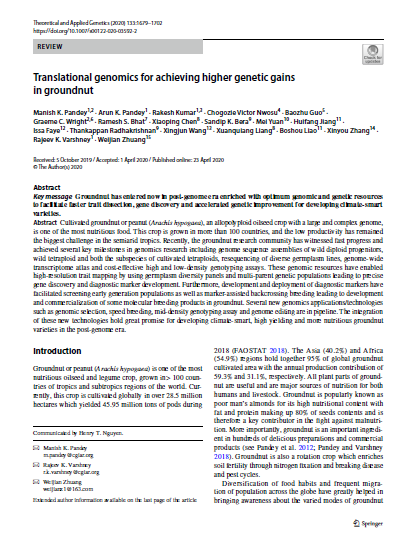Translational genomics for achieving higher genetic gains in groundnut
Summary
This article describes technological advances in translational genomics to achieve higher genetic gains with the cultivated groundnut or peanut (Arachis hypogaea), an allopolyploid oilseed crop with a large and complex genome. Groundnut is grown in more than 100 countries, and low productivity has remained the biggest challenge in the semiarid tropics. Recently, the groundnut research community has witnessed fast progress and achieved several key milestones in genomics research including genome sequence assemblies of wild diploid progenitors, wild tetraploid and both the subspecies of cultivated tetraploids; resequencing of diverse germplasm lines; a genome-wide transcriptome atlas; and cost-effective high and low-density genotyping assays. These genomic resources have enabled high-resolution trait mapping by using germplasm diversity panels and multi-parent genetic populations, leading to precise gene discovery and diagnostic marker development. Furthermore, the development and deployment of diagnostic markers have facilitated the screening of early generation populations as well as marker-assisted backcrossing breeding, leading to the development and commercialization of some molecular breeding products in groundnut. Several new genomics applications/technologies such as genomic selection, speed breeding, mid-density genotyping assay and genome editing are in the pipeline. The integration of these new technologies holds great promise for developing climate-smart, high yielding and more nutritious groundnut varieties in the post-genome era.
Open resource Download resource Access resource on external site

